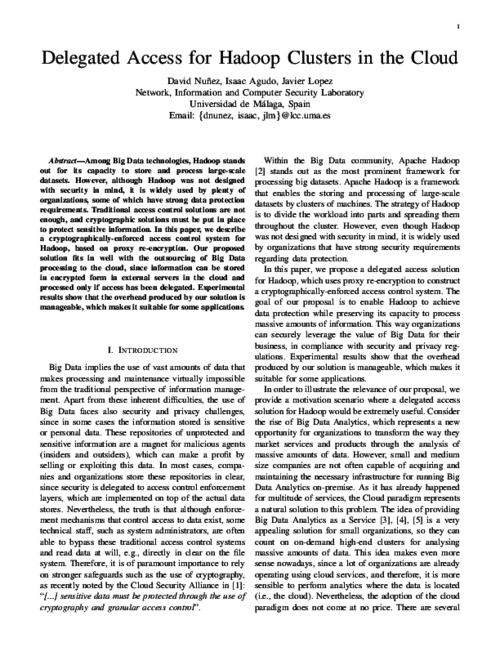 ] Title Type Year
] Title Type Year International Journal of Information Security, vol. 13, issue 2, Springer, pp. 199-215, 2014. DOI
Abstract
Identity management is an almost indispensable component of today’s organizations and companies, as it plays a key role in authentication and access control; however, at the same time it is widely recognized as a costly and time-consuming task. The advent of cloud computing technologies, together with the promise of flexible, cheap and efficient provision of services, has provided the opportunity to externalize such a common process, shaping what has been called Identity Management as a Service (IDaaS). Nevertheless, as in the case of other cloud-based services, IDaaS brings with it great concerns regarding security and privacy, such as the loss of control over the outsourced data. In this paper we analyze these concerns and propose BlindIdM, a model for privacy-preserving IDaaS with a focus on data privacy protection. In particular, we describe how a SAML-based system can be augmented to employ proxy re-encryption techniques for achieving data condentiality with respect to the cloud provider, while preserving the ability to supply the identity service. This is an innovative contribution to both the privacy and identity management landscapes.
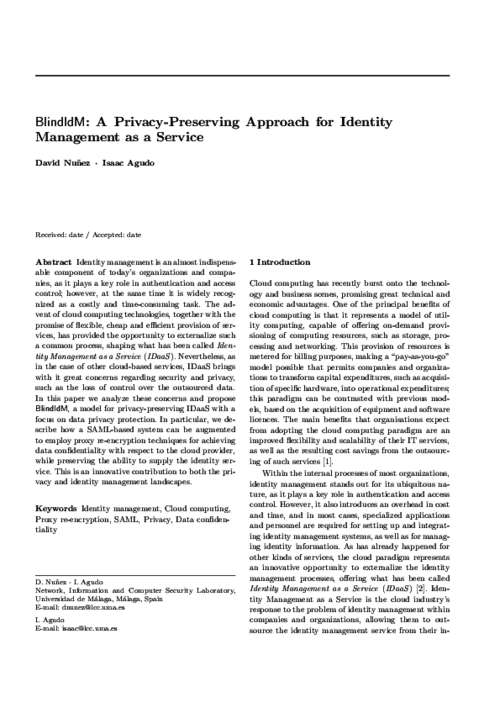
1st International Workshop on Security and Trust for Applications in Virtualised Environments (STAVE 2011), vol. 187, pp. 198-204, June, 2011. DOI
Abstract
Intercloud notion is gaining a lot of attention lately from both enterprise and academia, not only because of its benefits and expected results but also due to the challenges that it introduces regarding interoperability and standardisation. Identity management services are one of the main candidates to be outsourced into the Intercloud, since they are one of the most common services needed by companies and organisations. This paper addresses emerging identity management challenges that arise in intercloud formations, such as naming, identification, interoperability, identity life cycle management and single sign-on.
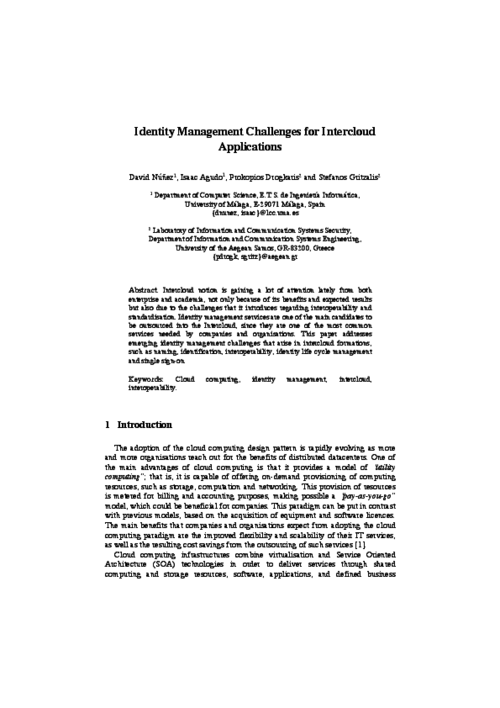
III Jornadas Nacionales de Investigación en Ciberseguridad, URJC, pp. 174-175, 06/2017.
Abstract
En este artículo presentamos un sistema que permite delegación de acceso a información cifrada para Apache Hadoop, de forma segura y transparente al usuario. Para ello usamos técnicas criptográficas avanzadas basadas en el recifrado delegado. Con este sistema, es posible almacenar en Hadoop los datos de forma cifrada y delegar de forma segura el acceso a los nodos de computación. El funcionamiento es transparente ya que se integra con la capa del sistema de ficheros nativa HDFS. Además, el recifrado delegado permite hacer rotación de claves de cifrado de forma segura y rápida.
IEEE CloudCom 2012, IEEE Computer Society, pp. 241 - 248, Dec 2012. DOI
Abstract
The inclusion of identity management in the cloud computing landscape represents a new business opportunity for providing what has been called Identity Management as a Service (IDaaS). Nevertheless, IDaaS introduces the same kind of problems regarding privacy and data confidentiality as other cloud services; on top of that, the nature of the outsourced information (users’ identity) is critical. Traditionally, cloud services (including IDaaS) rely only on SLAs and security policies to protect the data, but these measures have proven insufficient in some cases; recent research has employed advanced cryptographic mechanisms as an additional safeguard. Apart from this, there are several identity management schemes that could be used for realizing IDaaS systems in the cloud; among them, OpenID has gained crescent popularity because of its open and decentralized nature, which makes it a prime candidate for this task. In this paper we demonstrate how a privacy-preserving IDaaS system can be implemented using OpenID Attribute Exchange and a proxy re-encryption scheme. Our prototype enables an identity provider to serve attributes to other parties without being able to read their values. This proposal constitutes a novel contribution to both privacy and identity management fields. Finally, we discuss the performance and economical viability of our proposal.
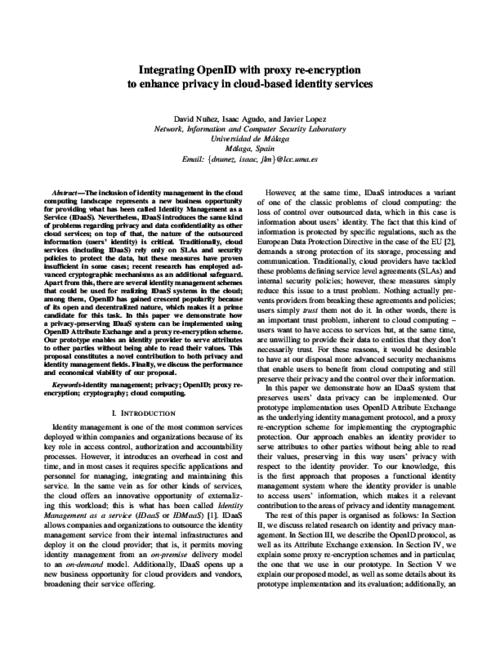
Journal of Network and Computer Applications, vol. 87, Elsevier, pp. 193-209, 06/2017. DOI
Abstract
This paper analyzes the secure access delegation problem, which occurs naturally in the cloud, and postulate that Proxy Re-Encryption is a feasible cryptographic solution, both from the functional and efficiency perspectives. Proxy re-encryption is a special type of public-key encryption that permits a proxy to transform ciphertexts from one public key to another, without the proxy being able to learn any information about the original message. Thus, it serves as a means for delegating decryption rights, opening up many possible applications that require of delegated access to encrypted data. In particular, sharing information in the cloud is a prime example. In this paper, we review the main proxy re-encryption schemes so far, and provide a detailed analysis of their characteristics. Additionally, we also study the efficiency of selected schemes, both theoretically and empirically, based on our own implementation. Finally, we discuss some applications of proxy re-encryption, with a focus on secure access delegation in the cloud.
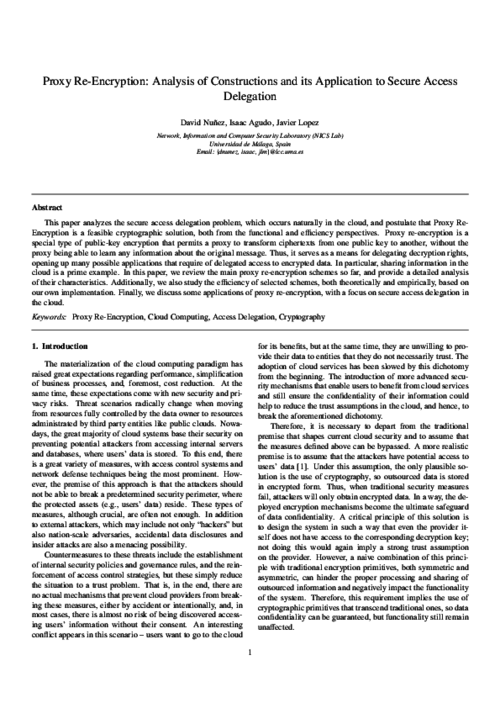
Ph.D Symposium of the European Conference on Service-Oriented and Cloud Computing (ESOCC) 2013, September 2013.
Abstract
The advent of cloud computing has provided the opportunity to externalize the identity management processes, shaping what has been called Identity Management as a Service (IDaaS). However, as in the case of other cloud-based services, IDaaS brings with it great concerns regarding security and privacy, such as the loss of control over the outsourced data. As part of this PhD thesis, we analyze these concerns and propose BlindIdM, a model for privacy-preserving IDaaS with a focus on data privacy protection through the use of proxy re-encryption.
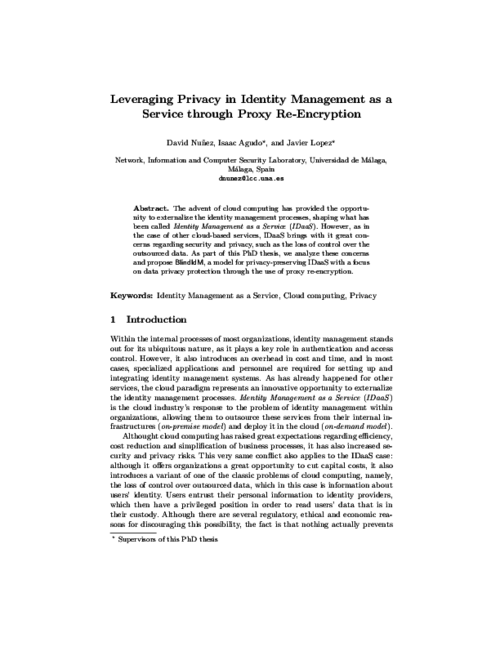
Accountability and Security in the Cloud, M. Felici, and C. Fernandez-Gago Eds., Lecture Notes in Computer Science 8937, Springer International Publishing, pp. 114-125, 2015. DOI
Abstract
In this paper we tackle the problem of privacy and confidentiality in Identity Management as a Service (IDaaS). The adoption of cloud computing technologies by organizations has fostered the externalization of the identity management processes, shaping the concept of Identity Management as a Service. However, as it has happened to other cloud-based services, the cloud poses serious risks to the users, since they lose the control over their data. As part of this work, we analyze these concerns and present a model for privacy-preserving IDaaS, called BlindIdM, which is designed to provide data privacy protection through the use of cryptographic safeguards.
2013 IEEE International Conference on Cloud Computing Technology and Science (CloudCom 2013), IEEE, pp. 355-362, 12/2013. DOI
Abstract
Cloud governance, and in particular data governance in the cloud, relies on different technical and organizational practices and procedures, such as policy enforcement, risk management, incident management and remediation. The concept of accountability encompasses such practices, and is essential for enhancing security and trustworthiness in the cloud. Besides this, proper measurement of cloud services, both at a technical and governance level, is a distinctive aspect of the cloud computing model. Hence, a natural problem that arises is how to measure the impact on accountability of the procedures held in practice by organizations that participate in the cloud ecosystem. In this paper, we describe a metamodel for addressing the problem of measuring accountability properties for cloud computing, as discussed and defined by the Cloud Accountability Project (A4Cloud). The goal of this metamodel is to act as a language for describing: (i) accountability properties in terms of actions between entities, and (ii) metrics for measuring the fulfillment of such properties. It also allows the recursive decomposition of properties and metrics, from a high-level and abstract world to a tangible and measurable one. Finally, we illustrate our proposal of the metamodel by modelling the transparency property, and define some metrics for it.
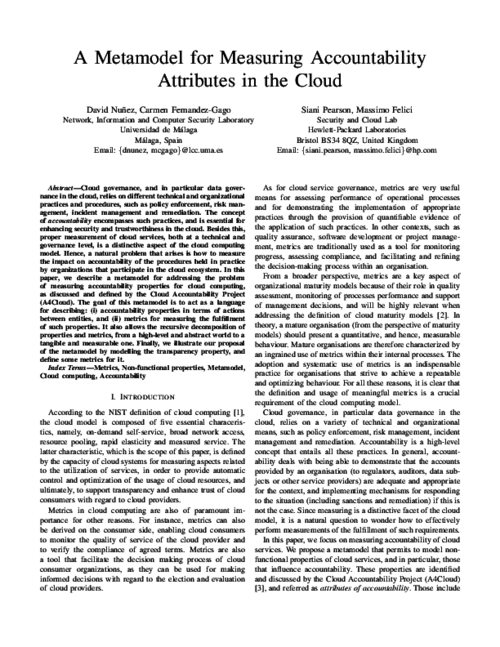
IEEE International Conference on Cloud Computing Technology and Science (CloudCom 2014), IEEE, pp. 374-379, 12/2014. DOI
Abstract
Among Big Data technologies, Hadoop stands out for its capacity to store and process large-scale datasets. However, although Hadoop was not designed with security in mind, it is widely used by plenty of organizations, some of which have strong data protection requirements. Traditional access control solutions are not enough, and cryptographic solutions must be put in place to protect sensitive information. In this paper, we describe a cryptographically-enforced access control system for Hadoop, based on proxy re-encryption. Our proposed solution fits in well with the outsourcing of Big Data processing to the cloud, since information can be stored in encrypted form in external servers in the cloud and processed only if access has been delegated. Experimental results show that the overhead produced by our solution is manageable, which makes it suitable for some applications.
